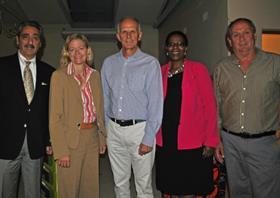
Exports of oranges from South Africa to the United States hit a new record in 2013, with nearly US$57m in sales or more than 39,000 tonnes in volume terms.
Last year's export turnover was 800 per cent higher than when the programme began fourteen years ago – in fact, during the past four years alone, South Africa’s citrus exports to the US increased 40 per cent in value and 25 per cent in volume.
The South African industry will this year celebrate 15 years of sales in the US since it gain entry to the market. With access first gained in 1999, the export programme was boosted further by the signing of the Africa Growth and Opportunity Treaty in 2000. This treaty will be reviewed next year and a possible renewal will be considered by the US government.
Consul General Erica Barks-Ruggles praised the efforts of the Western Cape Citrus Producers’ Forum (WCCPF) for its initiative in growing the export programme during the past 15 years.
“South Africa’s agricultural citrus exports are one of the country’s biggest success stories for increasing access to the United States under the Africa Growth and Opportunity Act. Fresh oranges are one example of the growing benefits South Africa derives from AGOA. Exports of oranges from South Africa to the United States hit a new record in 2013, with nearly $57m in sales or more than 39,000 tonnes in exports.”
She says this represents an increase of 40 percent in value and a 25 percent increase in volume compared with 2009, and nearly 800 per cent since the programme started in 1999.
“Do you know what else grew along with those figures? South African jobs; new exports mean new jobs,' Barks-Ruggles adds.
The development of the US market for summer citrus is estimated to have generated 20,000 permanent jobs in those areas of South Africa which have been approved for exports to the United States, she notes: “Up to 80,000 temporary positions have been created, supporting as many as 120,000 South Africans families. Citrus exports put South Africans to work: that is the real benefit of programmes like this one.”
Suhanra Conradie, CEO of the WCCPF, says the AGOA treaty has been very beneficial to Africa as a whole and especially to South Africa.
“The returns from this market have enabled the creation of jobs here and in the United States. Furthermore, the expansion of the citrus programme over 15 years has enabled us to reinvest in our Harvest of Hope programme for formerly disadvantaged people here in South Africa. As a result, better healthcare and education, as well as job advancement opportunities are available and supported by the citrus programme.
“But this is only a beginning and it is crucial that AGOA is renewed so that we can continue to create opportunities for all of South Africa’s citizens.”
Conradie explains that preparations for the upcoming season are well underway: “In preparation for the upcoming season, representatives of South Africa’s Department of Agriculture, Forestry and Fisheries (DAFF) have been in the citrus region inspecting farms to assure ongoing regulatory compliance with US requirements.”
DAFF representatives said that they were pleased with the consistent efforts of citrus growers to reduce the occurrences of false codling moth (FCM). Infestations have dropped significantly during the past three years in what is a comprehensive programme which includes breeding and sterilising male moths, and releasing them for mating disruption where no offspring are produced.
“Our programme to the US is successful largely due to the collaboration of DAFF and the USDA Animal and Plant Health Inspection Service division,” adds Conradie. “Working together and with the growers, we are able to assure compliance and avert issues before they become problems.”






No comments yet